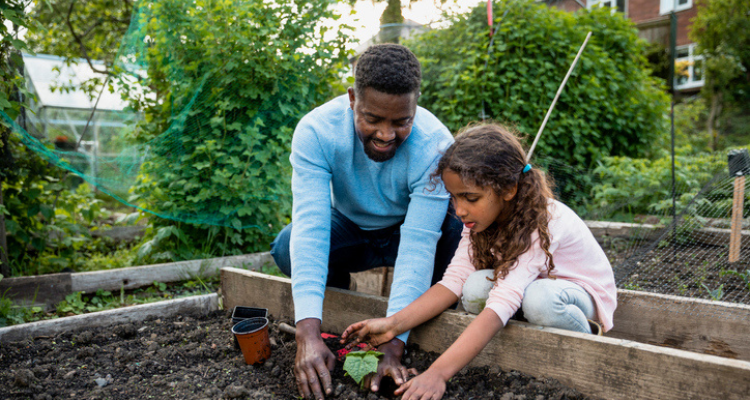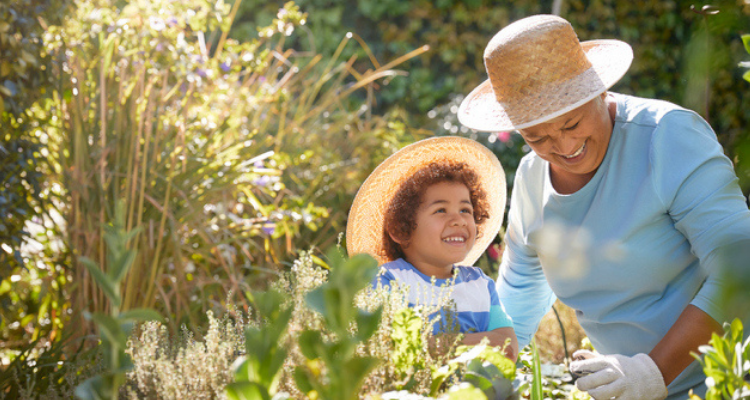
Being in nature doesn’t just feel good—research shows that spending time in nature provides massive mental health benefits. We also know that exposure to an array of bacteria in the earth can support immune health. Gardening combines these benefits and has a profound impact on mental, physical, and emotional health.
Whether you are a seasoned gardener or aspire to become one, gardening will play a positive role in your life in many ways.
10 mental health benefits of gardening
The following benefits of gardening can significantly impact your overall mental and emotional health.
cultivating acceptance
Mental health professionals largely agree that many people struggle with anxiousness and a desire to control their environment. When planting a garden, you offer your best intentions to lay a strong foundation and help your plants flourish, but ultimately hand over the reins to Mother Nature. As a result, gardening teaches life's unpredictability, allowing us the opportunity to practice relinquishing control.
Gardening can also help you move away from a perfectionist mindset and appreciate the beauty of your “imperfect” garden.

building a growth mindset
A growth mindset allows constant learning, growing, and changing, versus a fixed mindset’s tendency toward stagnancy, perfectionism, and failure. Gardens provide endless opportunities to learn and grow from mistakes. Whether it be overcrowding, a pest infestation, or something that just didn’t go quite right, these lessons can help improve your garden moving forward and allow you to cultivate a positive mindset in other realms of life.
connecting with family
Planting a garden with your children extends these benefits to the entire family. Learning about how food grows and getting the chance to eat from the earth encourages healthier eating habits, provides moderate exercise, develops analytical abilities, relieves stress, boosts mood, and even improves focus and concentration.[1]
When gardening or doing other outdoor activities, be conscious of ticks and constantly check the whole family, including pets. Wear long pants and socks if possible. Put bug repellents, like DEET, on the outside of clothes to reap the benefits while avoiding direct skin exposure to potentially harmful chemicals.
feeling connected to the earth
The Japanese refer to the practice of being out in nature as Forest Bathing, or Shinrin-Yoku, which boasts the many benefits of moving from a stress state to a relaxed state.[2] Gardening in your backyard or community garden is an easy way to be out in nature, even if you don’t have a forest nearby.
practicing mindfulness
Developing a mindfulness practice in daily life has been linked with a better mood, less anxiousness, and emotional reactivity.[3] Gardening is a practice that promotes mindfulness by focusing on precisely what you are doing and where you are. While gardening, tune into the sounds around you, the way the dirt and plants feel in your hands, and the smell of the earth. Simply observe, and if your mind wanders, gently guide it back to the present moment.
getting exercise
Physical activity is strongly linked with improved mental health, and gardening is an excellent form of mild to moderate exercise.[4] Working in the garden also prompts the body to move in a variety of ways, such as twisting, lifting, and squatting. These functional movements are essential for injury prevention, strength, and mobility.
increase energy
Research shows that as little as 20 minutes per day in nature can boost energy and feelings of vitality. Connecting with nature isn’t always easy if you live in an urban area. Starting a small home garden can create an outlet for nature-based stress management, relaxation, and better energy levels.
boost immune health
Being outdoors in the sunshine can help increase vitamin D levels, a crucial nutrient for immune health. The sunshine vitamin has been shown to decrease your chance of developing heart problems and other long-term health issues and helps to reduce your likelihood of contracting germs.[5] Getting your hands dirty in the soil and exposing yourself to beneficial bacteria might also contribute to a robust immune system.
managing stress
High stress is rampant in today’s society, and any regular practice that promotes relaxation, connection with nature, mindfulness, and acceptance can help manage stress levels and promote restful sleep. Many people find that gardening becomes a form of meditation that is helpful to feeling more consistently calm and centered.
growing your own food
Without a solid foundation of physical health, mental health is likely to suffer. A diet rich in home-grown organic plant foods is a well-known contributor to physical well-being and preventing future discomforts. A wide variety of green leafy, and colorful vegetables can provide a plethora of nutrients and antioxidants for optimal health.
takeaway: gardening for mental health
If you’ve never planted a garden, there are a wealth of online resources to get you started. Even without adequate outdoor space, you can start by growing herbs in indoor planter boxes or participating in a local community garden. Consider incorporating gardening for improved mental health for the entire family.

[1] Kuo, F. E., & Taylor, A. F. (2004). A potential natural treatment for… evidence from a national study. American journal of public health, 94(9), 1580–1586. https://doi.org/10.2105/ajph.94.9.1580
[2] Hansen MM, Jones R, Tocchini K. Shinrin-Yoku (Forest Bathing) and Nature Therapy: A State-of-the-Art Review. Int J Environ Res Public Health. 2017 Jul 28;14(8):851. doi: 10.3390/ijerph14080851. PMID: 28788101; PMCID: PMC5580555.
[3] Keng SL, Smoski MJ, Robins CJ. Effects of mindfulness on psychological health: a review of empirical studies. Clin Psychol Rev. 2011 Aug;31(6):1041-56. doi: 10.1016/j.cpr.2011.04.006. Epub 2011 May 13. PMID: 21802619; PMCID: PMC3679190.
[4] Sharma A, Madaan V, Petty FD. Exercise for mental health. Prim Care Companion J Clin Psychiatry. 2006;8(2):106. doi: 10.4088/pcc.v08n0208a. PMID: 16862239; PMCID: PMC1470658.
[5] Urashima M, Segawa T, Okazaki M, Kurihara M, Wada Y, Ida H. Randomized trial of vitamin D supplementation to prevent…in schoolchildren. Am J Clin Nutr. 2010 May;91(5):1255-60. doi: 10.3945/ajcn.2009.29094. Epub 2010 Mar 10. PMID: 20219962.


















